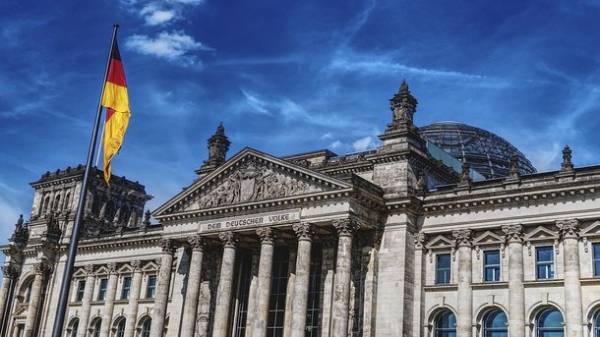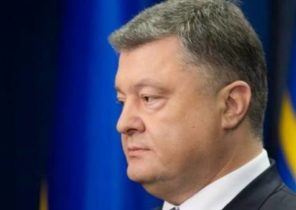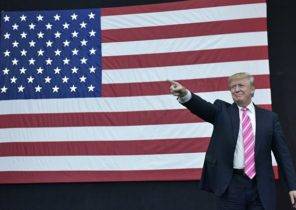
The winner of the parliamentary elections in Germany, according to preliminary data, became the CDU/CSU’s electoral list is headed by Chancellor Angela Merkel. But none of the parties won a majority. So then to political forces, which will go to the Bundestag, the challenging task of forming a coalition. According to estimates by political experts, today the option of such enterprises there is only one, but negotiations will be difficult.
The website “Today” to understand the features of the new German Parliament and its future influence on Germany and the Ukraine.
The results of the vote
Voter turnout in the parliamentary elections in Germany 76.2%. According to the official preliminary results of voting, the bloc consisting of the Christian democratic Union of Germany and Christian social Union in Bavaria (CDU/CSU), the electoral list is headed by Angela Merkel, scored 33% of votes. Compared to the previous elections, which were held in 2013, force your score worsened. In second place with 20.5% of votes is the Social democratic party of Germany (SPD) , headed by former Chairman of the European Parliament Martin Schulz. Three leaders from 12.6% of the vote closes, the party Alternative for Germany (ADH), which first took place in the Bundestag.
Followed by the Free democratic party of Germany (FDP) c 10.7 percent, the Left party c 9.2% and “Soyuz-90″/”Green” c 8.9 percent. Other political forces received less than five percent needed for representation in Parliament.
Coalition
After the announcement of exit poll, Angela Merkel said that the Alliance of the CDU/CSU is going to form the government and is ready to discuss with other parties the issue of coalition formation. However, from the participation of the SPD immediately refused, saying that goes to the opposition. According to experts, today the option of a coalition in the German Parliament, to the same part of the block Merkel, free Democrats and “green”.
“With the current balance of forces in the Bundestag there is only one option a coalition of Christian Democrats, free Democrats and “green”. This is a more complicated version of the coalition, but, nevertheless, it is possible. And in this situation the influence Merkel will be even stronger. Although, as is almost always the case in coalition governments, the post of Minister of foreign Affairs and, most likely, a post of the Minister of Finance will depart the coalition partners”, – told the “Today” political analyst Volodymyr Fesenko.
This possible coalition has dubbed “Jamaica” because of the color combination. Black symbolizes the CDU/CSU, yellow – free Democrats, and the green ecological party. This color combination is reminiscent of the flag of this island nation. And the Free democratic party of Germany (FDP) and Green stated willingness to negotiate toward the formation of such a coalition.
However, the formation of the coalition “Jamaica” will be preceded by difficult negotiations because the parties have fundamental disagreements, said the expert in international law Anton kuchukhidze. For example, in the implementation of NATO requirements to ensure that each member country of the Alliance has brought defense spending to 2% of GDP, Merkel’s party is in favour of this increase until 2024, and the “green” in General this idea is not considered, he said. And from free Democrats to Christian Democrats will be hard to negotiate in the matter of taxation, he said.
As for the other parties, which took place in the Bundestag – the Alternative for Germany and the Left party, is currently negotiating options with them on the topic of coalition formation was not noted Kuchukhidze.
“With the Left and the Alternative to negotiate will not, because they have a marginal position, and the centrist party will not go with them to the Union”, – said Volodymyr Fesenko.
Moreover, the arrival of the Bundestag, Alternative for Germany, Merkel called test.
“The real challenge was the arrival of ADH in the Bundestag. We will conduct a thorough analysis, so how are we going to win the votes of voters who voted for ADG”, – said Merkel.
SEE ALSO
- Merkel made a statement on the coalition negotiations
The loss of the CDU/CSU and the breakthrough of ADH
According to Angela Merkel, the Union of CDU/CSU, which, according to preliminary data, gained 33% of the votes counted for the best result. In the previous elections in 2013, the force received 41.5% of the vote. ADH, in turn, in 2013, gained 4.7 percent of the votes, whereas now, according to preliminary data, is 12.6%. According to political experts, its success was ensured by the crisis of migrants in Germany.
“Their success is a reflection of the migrant crisis, the wave of migration that is “flooded” part of Europe, and the blow fell on Germany in the first place, in the last 2-2. 5 years. This is the main explanation,” – said Fesenko.
Moreover, according to experts, for the same reason, declined the support of the votes of the CDU/CSU and the social Democrats. Both of these parties in the elections in 2017 showed the lowest result in postwar history, said Fesenko.
“Part of the traditional supporters of the Christian Democrats went to the free Democrats – said Fesenko, And the extreme right went to the Alternative because they were disappointed and annoyed by the problem of migrants, criticized Merkel for her position on the migrant issue.”
With the fact that the rating of party of Merkel reflected the discontent of the population regarding migration policy of “open doors,” agrees Anton kuchukhidze.
“The alternative to this very skillfully took advantage, and took the anti-immigrant niche and began to promote related social and economic problems. Accordingly, they got such a high score because you cannot say that Germans are not concerned about all those negative aspects that exist from illegal immigration. Burden on the economy and social sphere”, – says Kuchukhidze.
How will this affect Germany
According to Vladimir Fesenko, with the new Parliament of the German policy will not change much. However, the fact that Germany emerged two wings, in Parliament come from the extreme left and extreme right, makes the Bundestag a more pluralist and less centralist. Thus, in the German Parliament will be more populist, said Fesenko.
“As for real influence, but a strong media presence, speeches, which would be rather contradictory… I think they will never be remembered because of 12.6% is not so much to have a real influence on specific political decisions”, – said Anton kuchukhidze.
More importance, according to experts, is the failure of the SPD participation in the coalition. According to experts, it is this party, and not of ADH is considered a powerful and influential opposition in Germany.
Furthermore, as noted Fesenko, ADH is a very heterogeneous political force, and its members can be a problem in order to demonstrate a unified position on many issues.
“Many German experts say that the Alternative is so diverse party that might break up in the end. They are very hard to find a unity, because there are people with very different views they have on many issues there is no common position,” he says.
SEE ALSO
- In the leadership of the German party the “friends of Putin”, which was held in the Bundestag, there was a split
How will this affect Ukraine
New balance in the German Parliament will not lead to a fundamentally new changes in the Ukrainian questionin the first place because Angela Merkel will stay as Chancellor, says Fesenko. Moreover, as noted by Kuchukhidze, in Ukraine the mood of the “green” close to the Merkel – namely, that only the full implementation of the Minsk agreements may entail the lifting of sanctions against Russia. The position of the free Democrats on this issue is more flexible. Thus, the question of Ukraine, it is likely that the coalition “green” and the CDU/CSU will prevail over the position of free Democrats, he said.
“But three of those the party unites on Ukraine that no one puts Ukraine’s territorial integrity under any doubt,” – said the expert.
As for the Alternative for Germany, as said Fesenko, calling her absolutely Pro – Russian party is exaggeration. At the same time, a number of key figures in the party were in Russia, and voiced Pro-Russian statements.
SEE ALSO
- In Germany called the condition for the lifting of sanctions with Russia
We will remind, parliamentary elections in Germany held on September 24. According to preliminary results, Angela Merkel remains at the post of Federal Chancellor for a fourth term.







